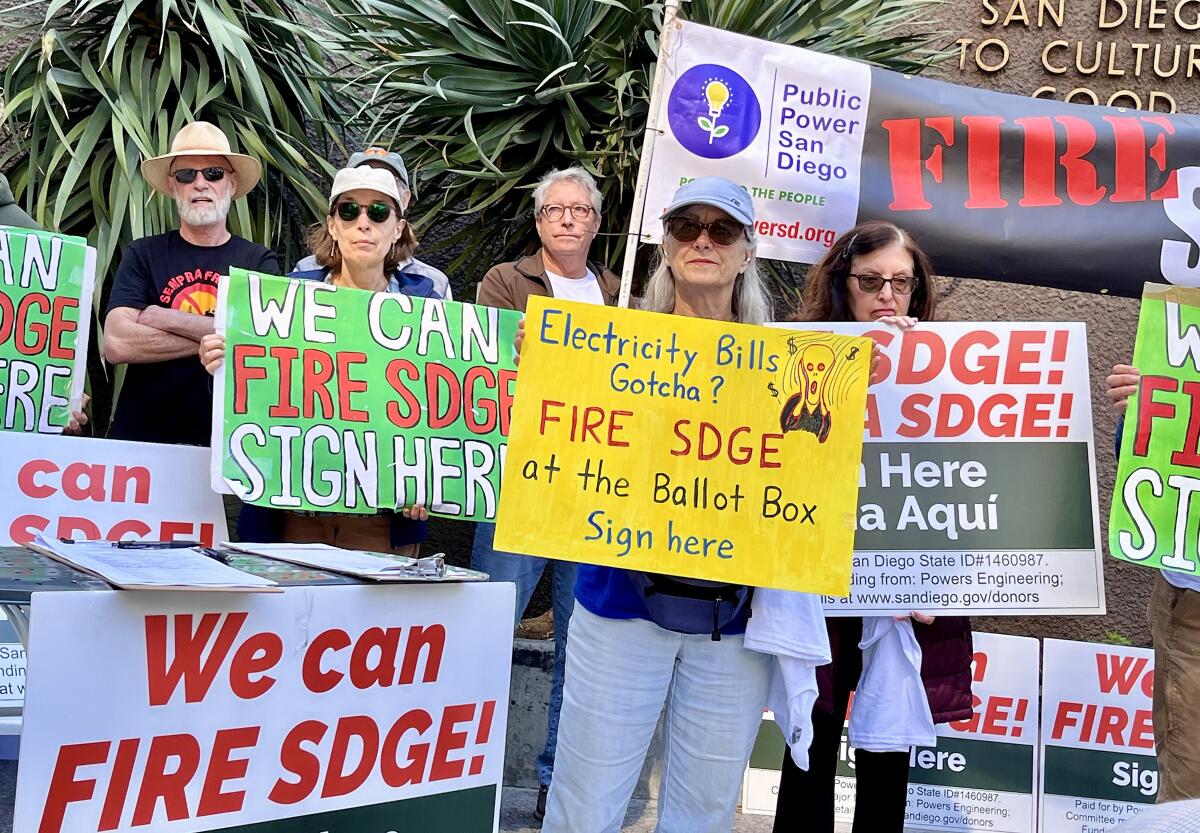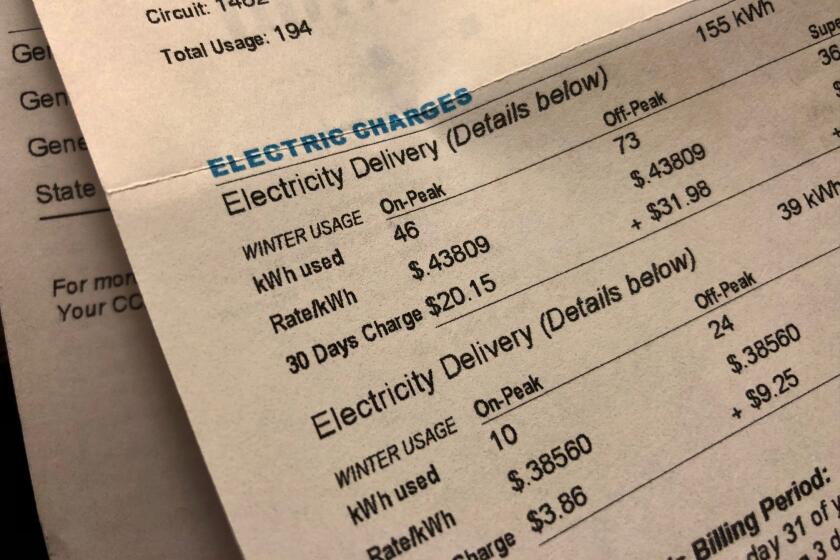Should voters decide if SDG&E be replaced by a municipal utility? Both sides exchange verbal jabs

Supporters of ballot measure say a municipal utility within San Diego will save customers money; opponents say it’s risky and expensive
The debate over whether the city of San Diego should create a municipal utility that would replace San Diego Gas & Electric is heating up.
The Power San Diego Campaign, which has launched a signature drive to get the question on the November ballot, gathered in front of San Diego City Hall on Tuesday, calling a rival political action committee thus far funded by SDG&E “shadowy.”
“We need to move forward now to give San Diegans lower rates, with something that we know will work for them,” campaign manager of Power San Diego Dorrie Bruggemann said.
Just a few yards away at Civic Center Plaza, about a dozen members of the union that represents roughly 1,500 SDG&E employees held a counter-demonstration opposing the ballot campaign.

“It’s absolutely reckless,” said IBEW Local 465 business manager Nate Fairman. “It’s going to stick the city or this municipal entity with hundreds of millions of dollars of liability, it’s a gamble that puts my union contract in the cross-hairs and damages my members’ ability to provide for their families.”
Under the Power San Diego proposal, the municipal utility would handle the electricity distribution responsibilities for customers within the city limits of San Diego only.
The campaign needs to collect about 80,000 valid signatures from registered city of San Diego voters to put its petition on the ballot this fall. The group said Tuesday it has gathered about 10,000 signatures so far.
Power San Diego estimates it would cost city taxpayers $3.5 billion to create a public utility and buy out SDGE’s electricity distribution assets — plus associated metering and startup costs. The group says the price tag can be paid through a municipal revenue bond that would be amortized over 30 years and pledges to support union workers.
Backers say making the switch will result in San Diego customers seeing about a 20 percent reduction in their electricity bills, citing how municipal utilities such as the Sacramento Municipal Utility District and the Los Angeles Department of Water and Power offer customers lower rates than California’s investor-owned utilities — SDG&E, Pacific Gas & Electric and Southern California Edison.
The Power San Diego Campaign took aim Tuesday at its political rival, Responsible Energy San Diego — a political action committee opposed to creating a municipal utility.
According to the city’s campaign finance disclosure portal, Responsible Energy San Diego has raised $300,000 since its founding last year. The group is co-chaired by the San Diego Regional Chamber of Commerce, the San Diego & Imperial Counties Labor Council and the Asian Business Association but according to city filings, all contributions so far have come from SDG&E shareholder funds.
Two of the officers for Responsible Energy San Diego are Scott Crider, SDG&E’s senior vice president of external and operations support, and Brittany Applestein Syz, SDG&E’s director of regional public affairs.
“This reveals that this is totally a front group for SDG&E,” said John Mattes, a volunteer for Power San Diego.
Responsible Energy San Diego spokesperson Matt Awbrey defended SDG&E’s involvement.
“This proposal that’s being discussed is a forced government takeover of the utility,” Awbrey said. “So that’s the reason there are many organizations joining in this effort because they’re concerned that this forced government takeover is going to leave us in a situation where you turn on the lights and they’re not working, at some point in the future.”
Awbrey said the group also has the backing of groups including the County of San Diego Black Chamber of Commerce, the San Diego County Hispanic Chamber of Commerce and the San Diego Working Waterfront, which represents industry on port tidelands.
As for Power San Diego, the city’s financial disclosures show it has raised $156,670 since last year.
The pro-municipal utility group is also wrangling with San Diego government officials.
The city has hired Colorado-based NewGen Strategies & Solutions to study the feasibility of creating a municipal utility. The consultant will take a deeper dive into the numbers when it comes before the San Diego City Council with Phase 2 of the study in the summer of 2025.
Power San Diego chair Bill Powers believes the study is flawed and on Tuesday announced he has filed a lawsuit in Superior Court, charging that the city has not produced public documents regarding details of the study.
“We can’t wait until 2025, we’re ready to go now,” Powers said. “If we can get local control by municipalizing the electrical grid, then we can implement some smart, efficient policies.”
The city responded with a statement that said in part that the feasibility study “is an extremely complex undertaking” and the city “has been committed to transparency in this process, including the intent to conduct the study in phases.”
Last September, all four members of the City Council’s Environment Committee listened to a presentation by Powers but declined to endorse his proposal to put it before voters. “We must get much more detailed data in terms of costs, expenses, liability (and) revenue projections,” said Councilmember Jennifer Campbell, adding that “it is way too premature” for the 2024 ballot.
The Power San Diego Campaign touts that about 20 not-for-profit electric utilities have been formed across the country in the last 20 years.
But in 2020, voters in Boulder, Colo., ditched a decade-long effort to replace the city’s existing utility Xcel with a municipally-run power company. That same year, Chicago considered creating a municipal utility, but then-Mayor Lori Lightfoot dismissed the idea after cost estimates came in at $5 billion to $10 billion.
Get U-T Business in your inbox on Mondays
Get ready for your week with the week’s top business stories from San Diego and California, in your inbox Monday mornings.
You may occasionally receive promotional content from the San Diego Union-Tribune.










